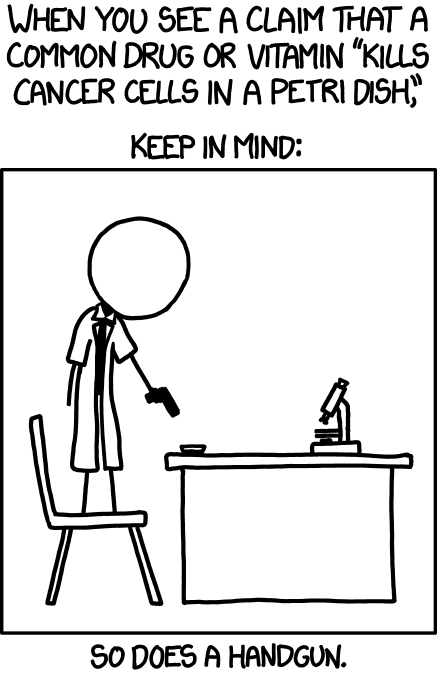In this study, the scientists simulated the process of spaced learning by examining two types of non-brain human cells — one from nerve tissue and one from kidney tissue — in a laboratory setting.
These cells were exposed to varying patterns of chemical signals, akin to the exposure of brain cells to neurotransmitter patterns when we learn new information.
The intriguing part? These non-brain cells also switched on a “memory gene” – the same gene that brain cells activate when they detect information patterns and reorganize their connections to form memories.
in a laboratory setting.

Technically, a handgun also kills cancer in vivo. The problem is the cost to the host body.
Okay but what you’re saying is if I hired a good enough marksman to shoot the cancer out of my body without killing me then that’s a good thing right?
I mean, that’s basically what we do with gamma radiation and chemotherapy, just a little bit more ballistic, right?
Exactly! The only difference is that those use very tiny bullets.
Chemo only applies if it’s doped with a radionuclide, otherwise it’s just regular poison.
deleted by creator
There are many stories on how the receiver of a transplant has felt themselves being “changed”, sometimes in ways that would remind people of the donor.
MDPI is like the lowest quality slop journal. Like anything gets peer reviewed in that thing.
Its not the same memory as your brain. your life story is not in your non nerve cells. they have memory the same as yeast has memory but everyone is aware of how we have muscle memory in reptitive tasks.
I think muscle memory is just a phrase, but the training that makes and embed the “muscle memory” is essentially nural
yeah sorry I still feel that is neural just not all the way to the brain. I guess what I was trying to say if the article is not that cells hold your memory but that they hold their type of memories is a similar way.
Yeah last week people on Lemmy were arguing that memory is the simplest thing to exist EVER and that musk’s neuralink meant we had matrix reloaded already at the corner
The hubris never ceases to amaze me
Musk is a snake oil salesman that buys other people’s ideas and pays smart people to make it, then steals all the profits for himself.
Modern day Thomas Edison.
Except he hasn’t electrocuted a live elephant to make a point. Yet.
In related news:
The complications include bloody diarrhea, partial paralysis, and cerebral edema, a condition colloquially known as “brain swelling.”
It’s called karma
Kwisatz Haderach here we come
“Muscle memory” is real.
As if haven’t know for a century that immune system has the ability to both form memories and problem solve, that rivals the brain. The body being able to adapt to external stimuli isn’t anything groundbreaking.
Is this the stuff responsible for organ donation receivers picking up traits of the donor?
Likely not that simple as there would be other factors at play, but good way of thinking. I’m no geneticist but that sounds like it may be a contributing factor, though memory in this case would be functional rather than personality-based.
So hold on a minute - does this mean there might be some truth to the whole “eat your fallen enemy to gain experience” thing? That’s wild.
naw. its more like the nerve pathways through the body also have their own node-weighting long before they get to the brain. those are used in process sometimes allowing for memory-like function
its still a generated system that you cant just eat
Closer to that whole organ transplant affecting someone’s personality I guess
Are you sure I can’t eat it? We should test this… for science.
Are you sure I can’t eat it? We should test this… for science.
The question then being: would it still be considered science if it’s not eaten raw but cooked and, say, accompanied with some wine?
Such as a nice chianti?
And fava beans.
Doesn’t count. They have to be slain in honorable battle.
So being boiled to death doesn’t count?
Eating a dictionary to improve your vocabulary would be equally effective to that theory, and for many of the same reasons. (As far as information transfer is concerned)
No, because you’re eating the flesh, so you’re digesting it.
This is more relevant to organ transplants.
Apparently, it’s a known phenomenon that some organ transplant recipients seem to inherit some traits and even memories of organ donors.
Wow, these examples are so cool.
Food Preferences:
- developed aversion to meat after receiving a heart from a vegetarian donor.
- experienced nausea after meals post-transplant from a donor with irregular eating habits.
- developed a taste for green peppers and chicken nuggets, foods favored by her donor.
Musical Preferences:
- began enjoying loud music post-transplant.
- developed a love for music after receiving a heart from a musician.
- started appreciating classical music, previously disliked, after transplant.
Sexual Preferences:
- Male recipient of a heart from a lesbian artist experienced heightened desire toward women.
- Lesbian recipient of a heterosexual woman’s heart found attraction to men.
Other Preferences and Aversions:
- Landscape artist’s heart recipient developed interest in art.
- Dancer’s heart recipient shifted color preferences to cooler tones.
- Fear of water developed post-transplant from drowning victim.
Memories:
- describes sudden unusual tastes accompanied by thoughts about their donor’s identity and life experiences.
- feels tactile sensations corresponding to the impact of the car accident that killed their donor.
- experiencing flashes of light and heat resembling the trauma suffered by their donor, who was shot in the face.
- describes a vivid dream of reckless driving, mirroring the circumstances of their donor’s fatal motorcycle accident.
Some recipients even experience dreams or memories aligning with their donor’s identity, such as a woman envisioning a young man named Tim during a dream and later discovering her donor’s name as Tim Lamirande
Unfortunately, though, I don’t see any mention of how certain they were that the recipients didn’t learn these things before experiencing them
Read something like that in an old science fiction novel.
Old man’s brain is placed in a young woman’s body. Her brain was destroyed but most of her memories live on in her body.
Reminds me of the guy that got a heart transplant and took up smoking like the original owner of the heart and started dating the original owners ex.
Was that a fictional work or actual patient?
From memory it was an actual patient but I wasn’t easily able to find it from a quick search.
I’ll take your word for it, because nobody ever lied on the interwebs.
[jk, thnaks for the response]
One of Iain M. Banks’ Culture novels has an exceptionally old character who is so exceptionally old that he’s had to turn most of his body into memory storage (sounds weird if you think in terms of computers) to keep remembering things. He stores his sexy memories in his balls.
Don’t remember that char, can you refresh my memory (I am fully aware of the irony given the topic under discussion)
He’s in Hydrogen Sonata. The mcguffin guy who everyone is trying to find and talk to because he’s the only person who’s old enough to remember some very important thing about the early days of the Culture.
I’d read that novel.
Old man hell bent on world domination, but really wants Johnny in math class to ask him to the dance on Friday.
"I Will Fear No Evil, " Robert Heinlein.
Robert Heinlein, I Will Fear No Evil
“Elderly billionaire Johann Sebastian Bach Smith is being kept alive through medical support and decides to have his brain transplanted into a new body. He advertises an offer of a million dollars for the donation of a body from a brain-dead patient. Smith omits to place any restriction on the sex of the donor, so when his beautiful young female secretary, Eunice Branca, is killed, her body is used—without his knowledge and to the distress of some of those around him.”
You can tell it’s a really old book because they talk about $1 million like it’s a lot of money.
“The Body Keeps the Score”
Is there an element of literality to the term “muscle memory”?
Yes, insofar as many reflexive actions, enervation and fiber recruitment thresholds respond to training, such that they “remember“ actions you have performed many times before. There are many clusters of nerves throughout the body called ganglia that are responsible for low-latency control of various functions that would entail too much delay when controlled entirely by the brain.
Generally, the minimum input-process-activation turnaround time of the brain is about 4 hz (240-250 ms) which is too slow for many applications of motor function. But the “co-processing” allowed by the extended nervous system enables the body to, with practice, execute far more rapid and complex action sequences in response to local stimuli. Some actions can be triggered and completed before a signal even makes it to the brain.
Generally, the minimum input-process-activation turnaround time of the brain is about 4 hz (240-250 ms) which is too slow for many motor functions. But the “co-processing” allowed by the extended nervous system enables the body to, with practice, execute far more rapid and complex action sequences in response to local stimuli. Some actions can even be triggered and completed before a signal makes it to the brain.
Thank you. For some reason it makes me happy to know that.
Its interestng, but kidney cells are not exposed to patterns of neurotransmiters like nerve cells are. Cells can be reprogramed to be stem cells as well with the right pattern od signals but that does not mean that it really happens in the body.








